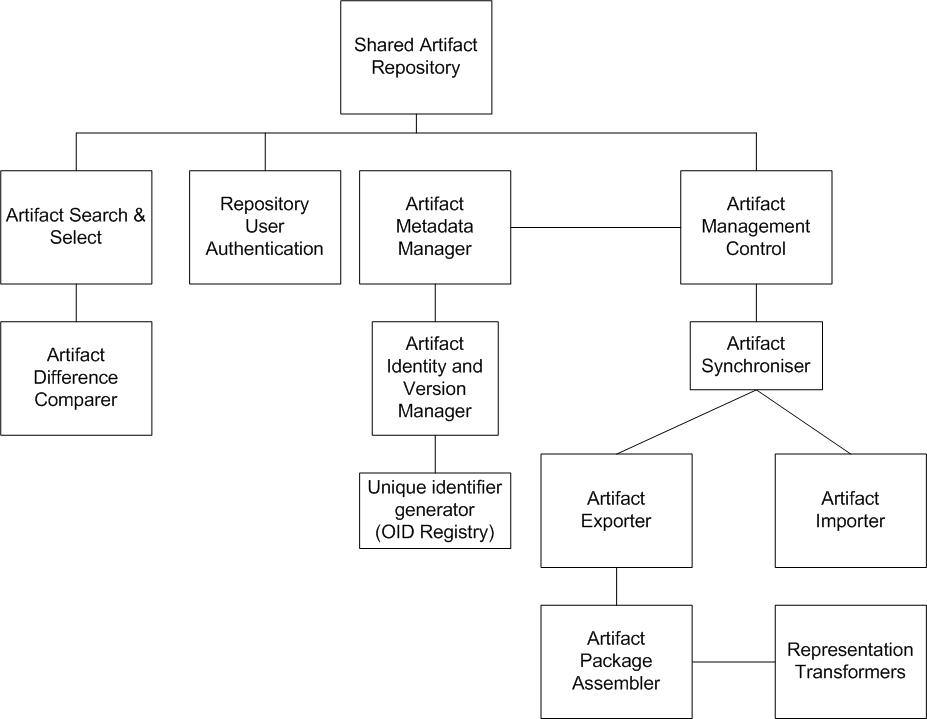This wiki has undergone a migration to Confluence found Here
Difference between revisions of "Proposed Shared Artifact Registry"
Jump to navigation
Jump to search
(New page: Back to Templates Registry Project left|frame|This is the [[HL7 Wiki logo!]]) |
|||
| (13 intermediate revisions by the same user not shown) | |||
| Line 1: | Line 1: | ||
| − | [[ | + | [[ Templates_Registry_Pilot | Back to Templates Registry Pilot Project Project]] |
| − | [[Image: | + | [[Image:Shared Artifact Registry.jpg]] |
| + | |||
| + | =Shared Artifact Repository= | ||
| + | |||
| + | ==Artifact Search and Select== | ||
| + | |||
| + | *Supports searching for artifacts either via selected meta-data parameters or by comparing artifacts against a presented artifact acting as a pattern (e.g. find all static models that are constraints of this static model). Once a search is sufficiently refined, support artifact selection for assembly into a package for export. | ||
| + | |||
| + | *Artifact Difference Comparer - Compares to artifacts and highlights differences | ||
| + | ==User Authentication== | ||
| + | Manages the verification authentication of user identities and their authorization to register controlled artifacts | ||
| + | ==Controlled Artifact Metadata Management== | ||
| + | Manages registration of artifacts according to the business rules of specific artifact types | ||
| + | |||
| + | * OID Registry - Manages the registration of OIDs | ||
| + | |||
| + | * Template Registry - Manages the registration of Templates | ||
| + | |||
| + | * Controlled Terminology Registry - Manages the registration of Terminologies including code systems, Concept Domains and Value Sets | ||
| + | * Ballot Artifact Registry - Manages the registration of ballot packages | ||
| + | |||
| + | * Normative Edition Package Registry - Manages the registration of Normative Editions | ||
| + | |||
| + | ==Artifact Management Control== | ||
| + | Manages unique artifact instances by recording appropriate metadata and ensuring unique identification and versioning according to business rules appropriate to the artifact type | ||
| + | |||
| + | ==Artifact Synchronization== | ||
| + | Typical source control functions of import, export and conflict resolution. | ||
| + | |||
| + | ==Package Management== | ||
| + | Manages assemblies of artifact instances, either as standard packages assembled according to a referenced index or custom packages assembled according to user preferences | ||
| + | |||
| + | *Additional capabilities could include transformation of stored artifacts to alternate representatations - eg. MIF to HTML | ||
Latest revision as of 22:04, 11 March 2010
Back to Templates Registry Pilot Project Project
Contents
Artifact Search and Select
- Supports searching for artifacts either via selected meta-data parameters or by comparing artifacts against a presented artifact acting as a pattern (e.g. find all static models that are constraints of this static model). Once a search is sufficiently refined, support artifact selection for assembly into a package for export.
- Artifact Difference Comparer - Compares to artifacts and highlights differences
User Authentication
Manages the verification authentication of user identities and their authorization to register controlled artifacts
Controlled Artifact Metadata Management
Manages registration of artifacts according to the business rules of specific artifact types
- OID Registry - Manages the registration of OIDs
- Template Registry - Manages the registration of Templates
- Controlled Terminology Registry - Manages the registration of Terminologies including code systems, Concept Domains and Value Sets
- Ballot Artifact Registry - Manages the registration of ballot packages
- Normative Edition Package Registry - Manages the registration of Normative Editions
Artifact Management Control
Manages unique artifact instances by recording appropriate metadata and ensuring unique identification and versioning according to business rules appropriate to the artifact type
Artifact Synchronization
Typical source control functions of import, export and conflict resolution.
Package Management
Manages assemblies of artifact instances, either as standard packages assembled according to a referenced index or custom packages assembled according to user preferences
- Additional capabilities could include transformation of stored artifacts to alternate representatations - eg. MIF to HTML
